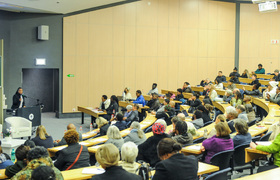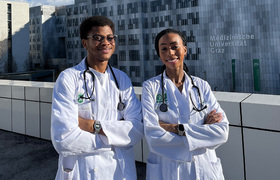How three minutes helps postgraduates master scientific literacy
23 October 2025 | Story Jess Oosthuizen. Photo Rawpixel. Read time 4 min.
In a global climate where research is encountering unprecedented scrutiny, increasing scepticism and declining investment, initiatives that contribute towards making science more meaningful to a lay audience have become more critical than ever. Annually, the University of Cape Town (UCT), together with other peer universities in the country, invites postgraduate students to participate in a blitz training programme geared at translating research.
Building society’s support and understanding of the vital role empirical research plays is essential to expanding the resistance towards growing threats to scientific progress. Science must be made compelling and accessible, with research findings interpreted in ways the public can understand and value. Ways relevant to society.
Postgraduates represent the future generation of leading researchers, thought leaders and scientists. It is crucial that they are enabled to develop the skills required to communicate their research to a wider non-specialist audience.
One such initiative is the Three-Minute Thesis (3MT) competition, an international organisation that challenges postgraduate students to consolidate their ideas and research findings by presenting them concisely to a non-specialist audience in just three minutes. 3MT is held annually in more than 200 universities worldwide. This year, 35 students presented at the UCT competition hosted by the Office for Postgraduate Studies (OPGS) in September. To help entrants develop the competencies needed to heavily condense their research and tailor it for a lay audience, the OPGS holds voluntary, online preparatory workshops.
Alongside the R5 000 cash prize awarded to the winners from each category, one of the critical skills gained from participating in this competition is scientific literacy.
Postgraduate presenters describe their experience of translating their research for a non-specialist audience
Participants from the 2025 competition shared their thoughts on the value of this unique opportunity which encourages them to explore and discover how to frame their studies in a way that is tangible to the public.
- “I'm passionate about science communication, especially to a non-specialist audience. A lot of people are climate denialists or ignorant about it. But, as climate scientists, we [must] also take the blame because we need to get better at communicating our message to [the public] to help them make informed decisions. This competition really challenged me to make my research more accessible and that’s something I want to keep improving on.” – Magata Mangatane | PhD student, Science, Technology, Engineering, and Mathematics (STEM) category.
- “Even though we have solutions for a lot of the problems that we see in the world we are failing to address them because people don’t understand the science behind these solutions. This is not to say that they don’t have the capacity to understand it; but rather science hasn’t been distilled [to enable] a non-specialist audience to make sense of it. So, for me, scientific literacy is the biggest thing to get right. [This competition] gave me an opportunity to do that with my research.” – Simon Carthew | master’s student, STEM category.
- “You’re usually explaining your research to people who have already bought into the idea. So, [until this competition] I hadn’t really had to question why [my research topic] is interesting… I think this is an important thing to do. Learn how to explain your thesis very simply to a broad audience. It's an important skill to learn.” – Cole Faraday | PhD student, STEM category.
- “Tuberculosis is such a big problem – people do not know that it is the deadliest disease in the world, because it is not a ‘glamorous’ one. Being able to share that reality with people outside my field is such a privilege. This experience has deepened my understanding of my work and its importance.” – Ahlisha Chetty | master’s student, STEM category winner.
- “I used [this competition] as a learning journey to see how I could reconceptualise and communicate my master’s research to anybody. I think it's important to be able to do this... Critical to my research is being able to communicate it.” – Guy Rudolph | Social Sciences & Humanities category.
PhD students Morgan Lee and Sibu Yokwana won the UCT competition in their respective categories Social Sciences & Humanities and STEM. They will participate in the 3MT National Competition at the University of the Free State on 24 October 2025.
Join the event online here to show your support.
 This work is licensed under a Creative Commons Attribution-NoDerivatives 4.0 International License.
This work is licensed under a Creative Commons Attribution-NoDerivatives 4.0 International License.
Please view the republishing articles page for more information.










